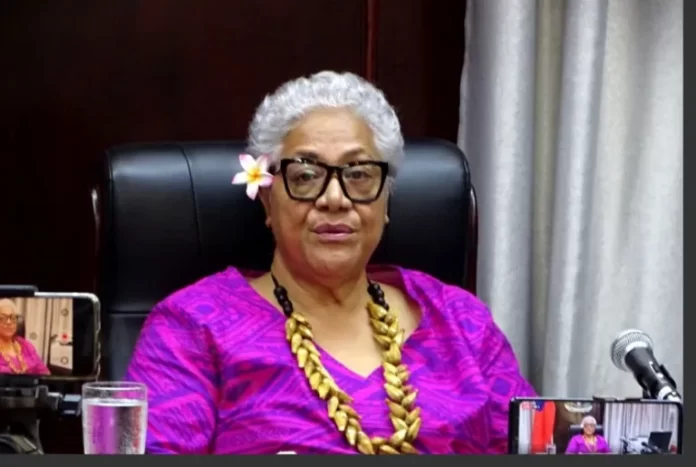Pacific leaders are warning time is running out to address climate change and are urging all nations, including Australia, to halve their emissions in the next decade.
Prime Minister Scott Morrison is in the midst of negotiating with the Coalition’s junior partner, the Nationals, to commit Australia to reaching net zero emissions by 2050.
Australia is one of the few developed countries yet to sign up to the mid-century target and is under international pressure to make the commitment ahead of international climate talks in Glasgow next month.
However, Samoa’s new Prime Minister, Fiame Naomi Mata’afa, wants more immediate action.
“We need to push for cutting emissions in half by 2030 to reach carbon neutrality by mid-century,” she said.
The Paris Agreement commits nations to limiting global warming to below 2.0 degrees Celsius and, preferably, below 1.5C.
Mata’afa said many Pacific nations would not survive the more frequent storms and cyclones, as well as rising sea levels and king tides, that would result from 2.0 degrees of warming.
“Hence, we must continue to push and demand more ambitious and more urgent climate action from everyone.”
Pacific leaders have appointed five political leaders from five different countries to champion their case at Glasgow, as not all will be able to attend the international talks.
For the Pacific, “no world meeting is more important”, according to Henry Puna, the Secretary-General of the Pacific Islands Forum, the region’s premier political leadership group.
“The stakes are high because climate change is an existential threat to our people and we know this [meeting] is the final opportunity to keep the 1.5 degrees threshold within reach and avoid a tipping point of no return,” he said at the announcement of the Pacific Climate Champions.
“On this current trajectory, we are on track for a climate catastrophe.
“Our very future, therefore, is at stake,” said Puna.
Aside from more ambitious emissions reduction targets, Pacific leaders want Australia to re-join the United Nation’s Green Climate Fund (GCF) to help them deal with the impacts of climate change.
The GCF sees developed countries pool funding to help smaller nations adapt to climate change and mitigate its effects.
Australia initially contributed to the GCF when it signed the Paris Agreement in 2015, but later withdrew, citing a preference to deal directly with recipient nations rather than via the UN.
However, Pacific countries would prefer it channelled through the GCF, to reduce the administration and paperwork involved in receiving multiple grants.
“Perhaps [Australia] could come back to the financing table. That would be a good start,” Mata’afa said.
The GCF helped pay for a new flood-management system to protect Samoa’s central business district and, according to Fiame, more will be needed to fund “new and resilient infrastructure, technology shifts towards green buildings, climate-proof roads and protection of local community assets”.
Contributions to the GCF will be central to the Glasgow talks, as it is a key point of contention between developed and developing countries.
Meanwhile, Morrison has indicated he may not attend the COP26 talks in Glasgow, despite both UK Prime Minister Boris Johnston and American President Joe Biden taking part.
“My first responsibility is to explain that to Australians, not to people overseas, at overseas conferences,” he said to Channel Nine on Tuesday.
“It’s an important conference, but the people I need to talk to most about our plan to reduce emissions and transition our economy over the next 30 years is to Australians, people in the Hunter Valley, people up there in Queensland, people in Victoria, in the west.”
Mata’afa declined to express an opinion on whether he should go, instead pointing out that many Pacific leaders will be unable to attend, due to the difficulty of obtaining commercial flights and navigating COVID-19 quarantine restrictions.
“We, ourselves, are finding it very difficult to make our way to Glasgow and even more challenging on the way back,” she said.
Despite the limitations imposed by COVID-19, Mata’afa sees the pandemic — and the international community’s response — as a source of hope.
“The development of COVID-19 vaccines was the fastest in history [and] its rollout around the world, at large scale, required a massive, co-ordinated global effort,” Mata’afa said.
“I often ponder on how we can push for this historical, united, urgent global response at the same massive scale to help us reach the 1.5 degree Celsius promise of the Paris Agreement,” he said.
SOURCE: ABC/PACNEWS














